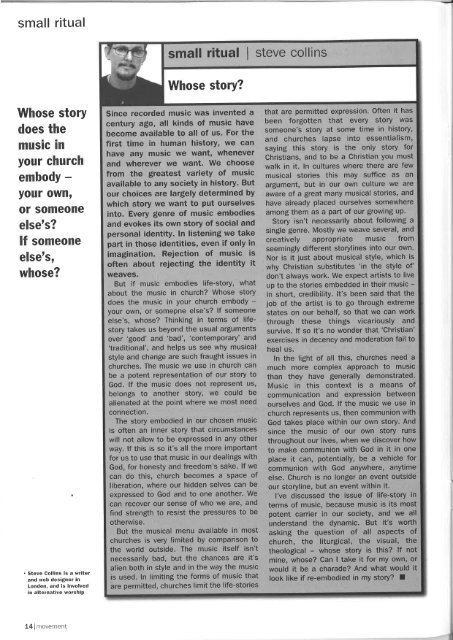Movement 113
Create successful ePaper yourself
Turn your PDF publications into a flip-book with our unique Google optimized e-Paper software.
small ritual<br />
tr<br />
small ritual I<br />
Whose story?<br />
steve collins<br />
Whose story<br />
does the<br />
music in<br />
your church<br />
embody -<br />
your own,<br />
or someone<br />
elsets?<br />
lf someone<br />
elsets,<br />
whose?<br />
. Steve Collins is a wtiter<br />
and web designer in<br />
London, and is involved<br />
in alternative worship<br />
Since recorded music was invented a<br />
century ago, all kinds of music have<br />
become available to all of us. For the<br />
first time in human history, we can<br />
have any music we want, whenever<br />
and wherever we want. We choose<br />
from the $reatest varietY of music<br />
available to any society in history. But<br />
our choices are lar$ely determined by<br />
which story we want to Put ourselves<br />
into. Every genre of music embodies<br />
and evokes its own story of social and<br />
personal identity. ln listenin$ we take<br />
part in those identities, even if only in<br />
imagination. Rejection of music is<br />
often about rejecting the identity it<br />
weaves.<br />
But if music embodies life-story, what<br />
about the music in church? Whose story<br />
does the music in your church embody -<br />
your own, or somepne else's? lf someone<br />
else's, whose? Thinking in terms of lifestory<br />
takes us beyond the usual arguments<br />
over 'good' and 'bad', 'contemporary' and<br />
'traditional', and helps us see why musical<br />
style and change are such fraught issues in<br />
churches. The music we use in church can<br />
be a potent representation of our story to<br />
God. lf the music does not represent us,<br />
belongs to another story, we could be<br />
alienated at the point where we most need<br />
connection.<br />
The story embodied in our chosen music<br />
is often an inner story that circumstances<br />
will not allow to be expressed in any other<br />
way. lf this is so it's all the more important<br />
for us to use that music in our dealings with<br />
God, for honesty and freedom's sake. lf we<br />
can do this, church becomes a space of<br />
liberation, where our hidden selves can be<br />
expressed to God and to one another. We<br />
can recover our sense of who we are, and<br />
find strengfh to resist the pressures to be<br />
otherwise.<br />
But the musical menu available in most<br />
churches is very limited by comparison to<br />
the world outside. The music itself isn't<br />
necessarily bad, but the chances are it's<br />
alien both in style and in the way the music<br />
is used. ln limiting the forms of music that<br />
are permitted, churches limit the life-stories<br />
that are permitted expression. Often it has<br />
been forgotten that every story was<br />
someone's story at some time in history'<br />
and churches lapse into essentialism'<br />
saying this story is the only story for<br />
Christians, and to be a Christian you must<br />
walk in it. ln cultures where there are few<br />
musical stories this may suffice as an<br />
argument, but in our own culture we are<br />
aware of a great many musical stories, and<br />
have already placed ourselves somewhere<br />
among them as a part of our growing up.<br />
Story isn't necessarily about following a<br />
single genre. Mostly we weave several, and<br />
creatively appropriate music from<br />
seemingly different storylines into our own.<br />
Nor is it just about musical style, which is<br />
why Christian substitutes 'in the style of'<br />
don't always work. We expect artists to live<br />
up to the stories embedded in their music -<br />
in short, credibility. lt's been said that the<br />
job of the artist is to go through extreme<br />
states on our behalf, so that we can work<br />
through these things vicariously and<br />
survive. lf so it's no wonder that 'Christian'<br />
exercises in decency and moderation failto<br />
heal us.<br />
ln the light of all this, churches need a<br />
much more complex approach to music<br />
than they have generally demonstrated.<br />
Music in this context is a means of<br />
communication and expression between<br />
ourselves and God. lf the music we use in<br />
church represents us, then communion with<br />
God takes place within our own story. And<br />
since the music of our own story runs<br />
throughout our lives, when we discover how<br />
to make communion with God in it in one<br />
place it can, potentially, be a vehicle for<br />
communion with God anywhere, anytime<br />
else. Church is no longer an event outside<br />
our storyline, but an event within it.<br />
I've discussed the issue of life-story in<br />
terms of music, because music is its most<br />
potent carrier in our society, and we all<br />
understand the dynamic. But it's worth<br />
asking the question of all aspects of<br />
church, the liturgical, the visual, the<br />
theological - whose story is this? lf not<br />
mine, whose? Can I take it for my own' or<br />
would it be a charade? And what would it<br />
look like if re-embodied in my story? I<br />
14 | movement

















